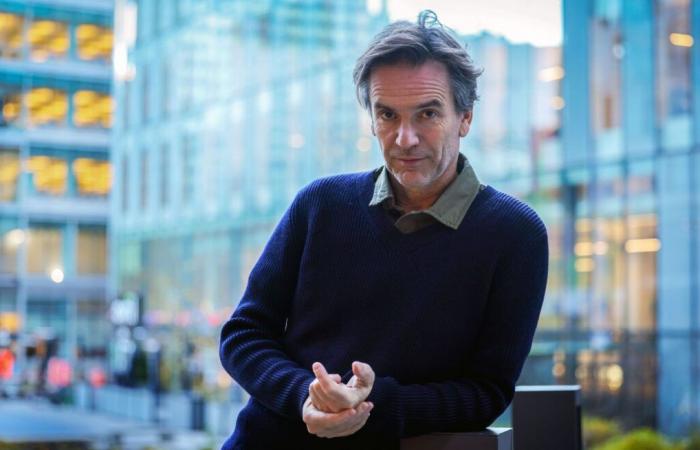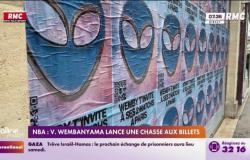Souleymane is a young undocumented Guinean who earns his living as a bicycle courier in Paris. In two days, he must be interviewed at the French Office for the Protection of Refugees and Stateless Persons. However, when every day is a struggle to meet basic needs like finding something to eat and having a roof, any roof, over your head to sleep in, 48 hours is a long time. At each race, at each meeting, everything can change. Co-written and directed by Boris Lojkine, Souleymane’s story shows an exceptional performance from a non-professional: Abou Sangaré. In an interview, the filmmaker talks about the genesis and behind the scenes of a profoundly humanist film.
“The image of these bicycle couriers crisscrossing the streets of Paris struck me one day. With their fluorescent bibs in the colors of the delivery applications, they are very visible. We see all these crowds of Africans waiting for orders in front of big chains like McDonald’s or KFC… It’s quite recent in the landscape. It’s paradoxical, because we often say that these people are invisible, when on the contrary they are very visible. In short, from this image, I spontaneously imagined a guy on a bike who takes us from one place to another, in a very dynamic movement,” explains Boris Lojkine, whom I met last fall during his visit to Cinemania.
Note that upstream, Souleymane’s story won the Jury, Best Actor and International Critics Prizes in the Un Certain Regard section at Cannes. For the record, Boris Lojkine is making his third film linked to the African continent: Hope relates the arrival in Morocco of a Cameroonian refugee and a Nigerian refugee, while Camille recounts the experiences of a photojournalist in the Central African Republic.
“I wanted to make a film with this community of African couriers in Paris, but without knowing exactly how. I started by doing what I always do: field work. I approached delivery men on the street, to interview them. Several refused, out of distrust, but others accepted that I offer them a coffee and that we talk. Those who agreed to speak to me did so very freely, with an open heart. It gave me a lot of documentary material that I could draw on. I knew that most of these delivery people were undocumented, and that’s what interested me. Because, in this condition, to get anything, you have to go through an intermediary: to sublet a delivery account, to prepare the asylum application, to get a room… Everything. And often, it’s a racket. »
The day you have your asylum interview is THE day that can change your whole life. So, it was obvious that we had to build the story around that.
Precariousness and tension
In this regard, the film expertly highlights the fact that, within these frenetic and suspenseful existences of undocumented couriers, everything is precarious.
“Several couriers have told me how having their bike stolen put their situation in jeopardy. But this film had already been made,” says Boris Lojkine, smirking.
No question, therefore, of remaking the masterpiece The bicycle thiefby Vittorio De Sica. Moreover, the daily pitfalls that these couriers face are so numerous and diverse that Boris Lojkine and, later, his co-writer, Delphine Agut, did not have to draw on what has “already been done” to write their scenario.
“The day you have your interview for your asylum application is THE day that can change your whole life,” notes the filmmaker. So, it was obvious that we had to build the story around that. As this interview is perceived by him as vital, it generates enormous stress, which, in turn, generates tension that the public feels. The feeling of urgency is created and nourished at the three main stages of writing, filming and editing. We have this countdown as the interview approaches, but we establish that the protagonist is not ready, and that in addition he has a money problem which means that he cannot obtain the documents that he must present during said interview… The mechanics of the thriller are there, but without betraying the social realism of the film. »
To clarify Boris Lojkine about this imperative to respect the “social realism” dimension: “Perhaps it is hints of my past in documentary, or in anthropology, but I like that the scenario is not an authorial decision, but rather arises from the material itself. »
Nevertheless, since he wanted his social drama to take on the trappings of a thriller, Boris Lojkine had to make sure to create tension. This, from a very small budget. In other words, suspense could only be created using elementary cinematographic means.
-“During filming, we had to speed up everything. Because delivery, in reality, is not interesting: they are repetitive and banal actions. It becomes interesting — and urgent — through succession, and the speed of succession. The main instruction I gave to Abou Sangaré during filming was: “Faster. » Get on the bike, get off the bike, put the lock on, get in, get out, open the bag, close the bag… Everything, faster. This speed in the image promotes tension, and therefore urgency. »
To say it works is an understatement.
A powerful silence
Regarding Abou Sangaré, the film would probably not work without his acting, precisely, under tension. Worried, on the lookout, his Souleymane is overwhelming.
“I met Abou Sangaré after a wild casting call, after a process of almost three years of research and writing. I focused on the Guinean community, because the largest concentration of couriers and asylum seekers is Guineans. After auditioning 200 people, we found ourselves in Amiens, no longer in Paris, but in the north of France, and there, an association brought together 25 Guineans for us, including Abou. »
After almost missing the audition, scheduled during his working hours, Abou Sangaré caught up with the director and his casting director on the station platform: a scene worthy of a film. A short camera test is conclusive: the young man is brought to Paris.
“We spent the day with him and had him improvise. In one of these improvisations, he had to react to the announcement of a refusal to a request for papers. He remained silent. And from his silence something very powerful emerged. »
In the film, we witness some of these powerful silences, in, it should be noted, different dramatic contexts.
Moreover, we will refrain from revealing how the film ends, but we will recall that after three refusals and a threat of expulsion, Abou Sangaré finally obtained a review, accompanied by a one-year residence permit. . Sometimes, that’s also the magic of cinema.
The movie Souleymane’s story will be on display on January 24.






